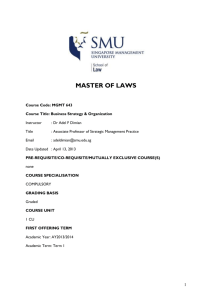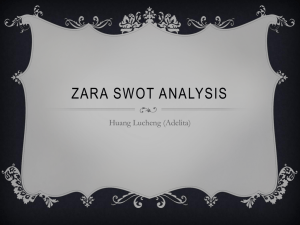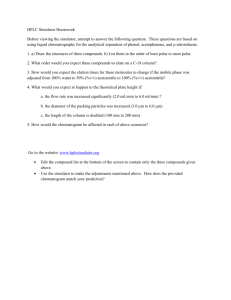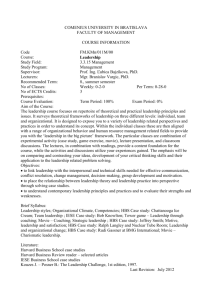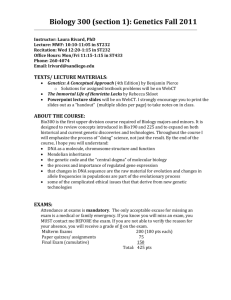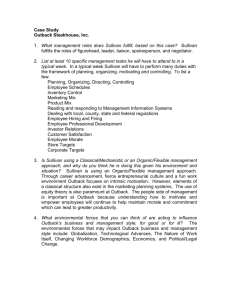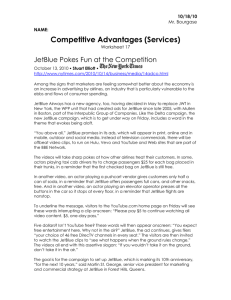Recommended Text and Readings
advertisement
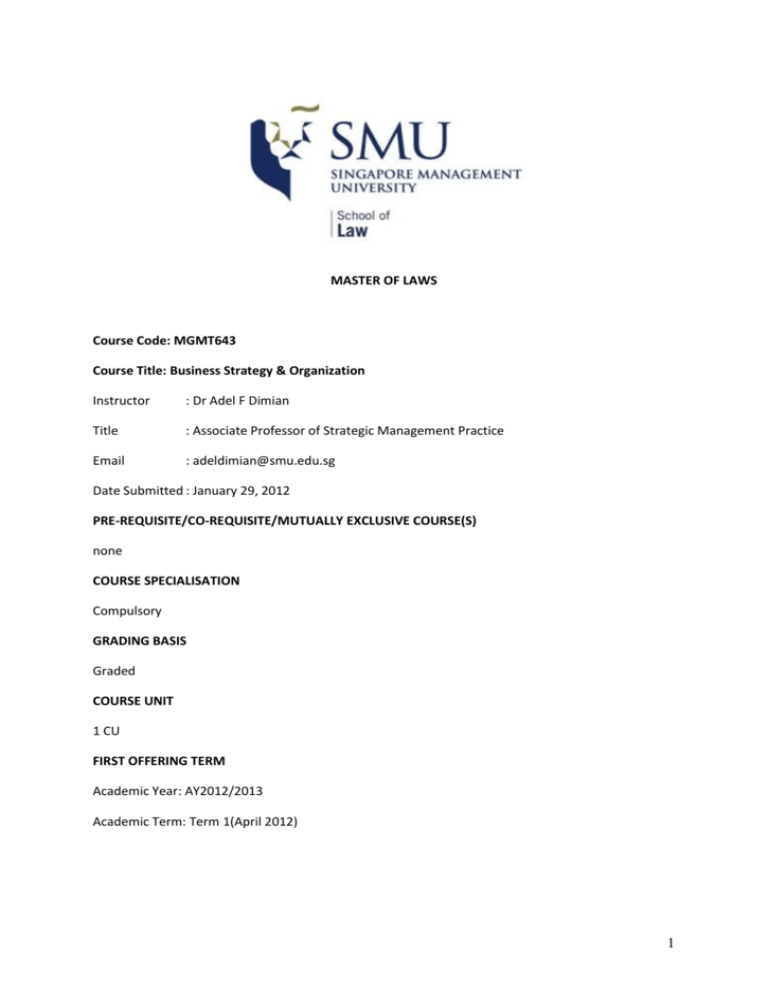
MASTER OF LAWS Course Code: MGMT643 Course Title: Business Strategy & Organization Instructor : Dr Adel F Dimian Title : Associate Professor of Strategic Management Practice Email : adeldimian@smu.edu.sg Date Submitted : January 29, 2012 PRE-REQUISITE/CO-REQUISITE/MUTUALLY EXCLUSIVE COURSE(S) none COURSE SPECIALISATION Compulsory GRADING BASIS Graded COURSE UNIT 1 CU FIRST OFFERING TERM Academic Year: AY2012/2013 Academic Term: Term 1(April 2012) 1 COURSE DESCRIPTION This course introduces participants to the theoretical concepts and analytical tools required for formulating and implementing appropriate strategies that affect the enduring success of the entire organization. Topics covered include external and internal environmental analyses, business-level strategies, corporate-level strategies, strategy process implementation and organization. This course emphasizes the application of theory to the real world strategic issues. Participants are encouraged to synthesize their existing knowledge and experience in various industries and backgrounds into a comprehensive understanding of strategy. LEARNING OBJECTIVES By the end of this course, participants will be able to: A. Theories of Strategic Management By the end of this course, students will know: The fundamental theories and frameworks which help us understand strategy in a firm The interaction of the internal and external environments on a firm’s strategy Understand how the functions of a firm combine to deliver strategic success B. General skills By the end of this course, students will be able to: Apply frameworks to develop sound strategies Use tools to analyze the environment of a firm Apply relevant practices to organize and execute strategy in a firm C. Action-oriented Attitude By the end of this course, students will: Have a practical understanding of the role and practice of strategic management Understand their role in the analysis, formulation and execution of strategy Be able to apply strategic thinking to any industry and opportunity Be able to participate and lead strategy PRE-REQUISITE/ CO-REQUISITE/ MUTUALLY EXCLUSIVE COURSE(S) none RECOMMENDED TEXT AND READINGS Strategy Analysis & Practice 2nd ed; McGee, Thomas, Wilson; McGraw-Hill. Glo-Bus Strategy Simulator Game Access Card (included in course text). Our Iceberg Is Melting: Changing and Succeeding Under Any Conditions; John Kotter. Case Studies: Apple Computer 2010 JetBlue Airlines: Starting from Scratch ColaWars Continue Zara: Fast Fashion Dimbulah Coffee Food Empire (HBS# 9-710-467) (HBS# 9-801-354) (HBS# 9-702-442) (HBS# 9-703-497) SMU-11-0004 SMU-11-0010 2 ADDITIONAL REFERENCE MATERIAL Supplementary material: In addition to the required textbook, course packet if cases and articles and simulator access, the following texts on strategic management and alternate theories are available in the library for supplementary reading. Use these texts for reference or further learning/clarification of the material taught during the course. They are not required readings but may enhance your learning. Competitive Strategy: Techniques for Analyzing Industries and Competitors, Michael E. Porter (Free Press, 1998). Competitive Advantage: Creating and Sustaining Superior Performance, Michael E. Porter (Free Press, 1998). Blue Ocean Strategy: How to Create Uncontested Market Space & Make the Competition Irrelevant, W. Chan Kim & Renee Mauborgne (Harvard Business School Press, 2005). Game Theory at Work: How to Use Game Theory to Outthink and Outmaneuver Your Competition, written by James D. Miller (McGraw-Hill, 2003). Business dailies/weeklies to include: The Asian Wall Street Journal, The Economist, Business Times, Financial Times. ASSESSMENT METHOD Participation (Individual) Learning Journal & Essay (Individual) Simulator (Team) Final Exam (Individual) Total 25% 25% 25% 25% 100% INSTRUCTIONAL METHODS AND EXPECTATIONS Participation (Case Discussion) This course is designed around the case study methodology (25% of the grade). As such, it is critical that you prepare thoroughly prior to class discussion. In this portion of the grading, it is most important to prepare so that a meaningful and challenging discussion may ensue among your classmates and your professor. Students are encouraged to think freely and express thoughts based on the case facts. In many cases, there is no right answer and it is heartily encouraged that students challenge convention, though this challenge should, at a minimum, be based on solid theory and practical outcomes. Through analysis and discussion in class, you will learn to better understand the nature of firm’s strategy and the processes of its formulation and execution. Questions to ponder while preparing the case are shown below, these are meant as a guide to the relevant point of the case: Apple Describe the Personal Computer (PC) industry structure and the external environment that Apple and the PC industry faced in the early 1980’s and compare it to the industry structure and external environment today. How did the i-products (i-pod, i-phone, i-pad) affect the forces in the PC industry? Comment on Steve Jobs and his leadership at various times in his career. When did he show positive attributes and when did he show less than positive attributes. How did he change? 3 Jetblue Discuss the internal capabilities that JetBlue used to achieve competitive advantage. What part of the value chain played the most critical role in their success? Why? Was David Neeleman smart to enter the US domestic airline at that time? What part of his leadership do you think was his strongest attribute? Cola Wars Historically, how do Coke and Pepsi compete? What is the nature of their completion and by what basis to they try to distinguish themselves? If you could be a bottler or a concentrate producer, which would you choose? Who is winning the “Cola Wars?” Zara What is the nature of Zara’s competitive advantage? Describe their upstream and downstream strategy and how they may work together. How did they achieve this and what is the overall driving philosophy behind it? How would you manage the portfolio of Inditex businesses? Food Empire Why Russia? Should Nair stay in Russia based on what he knows in August 1998? Dimbulah Coffee What recommendations would you give to Chris Wanden to grow his business 10-fold? Should he? Simulator Teams will apply their learning’s from the course to a simulator game (25% of the grade) in the last portion of the course. Using the concepts in strategy formulation and execution, students and their teams will compete head-to-head in a strategy game that measures the outcome of strategic decisions and their follow-through. Essay Write an essay (4 page minimum) on your own experiences related to transformative change. Use the principles discussed in the book: My Iceberg is Melting. Discuss your real case experience and use the concepts learned from these books. What was the situation? Who were the players? What worked well and what did not? Provide insight into these and other relevant questions. Learning Journal The learning journal is a one page minimum email submission to the designated dropbox. In that journal, I am looking for what you have learned in that week related to our course material and discussion, application of your own experiences, thoughts that derived and are related to the learning, additional information you found and your interpretation of its support (or not) etc. It is an open format and it is yours to use to reflect upon your learning and experience. The learning journal is due by Sunday midnight every week during the course. Final Exam Details of the final exam (25% of the grade) will be provided in class. A Note on laptops and Phones The policy for electronics in class is based purely on the goal to maximize the learning environment. Laptops and devices are not allowed to be open or in use during lecture and case discussion. Laptops may be called for during certain team break-out sessions--bring them to class but please 4 keep them off the table until requested. Phones should be turned to silent and left off the table. If you are expecting an urgent call or have a situation, please inform prior so we can make arrangements that do not disrupt the class. We all need to be present so let’s unplug while we share our knowledge and learn. Thanks in advance. COURSE SCHEDULE Session Topics Case Study Readings 1 Introduction to Strategy 2 External Analysis & Industry Structure Apple 3 Internal Analysis jetBlue 4 Competitive Dynamics Cola Wars Sim Manual 5 Business Level Strategy Zara Chp 6 6 Corporate Level Strategy Zara Chp 5 7 International Strategies; M&A Food Empire 8 Growth Strategies Dimbulah 9 Execution, Change, Ethics & Organization 10 Strategic Leadership Simulator Chp 1,4& 9; Articles Chp 3 Intro Sim Decisions Chp 2 Chp 8 Sim Discussion Important: Academic Integrity All acts of academic dishonesty (including, but not limited to, plagiarism, cheating, fabrication, facilitation of acts of academic dishonesty by others, unauthorized possession of exam questions, or tampering with the academic work of other students) are serious offences. All work (whether oral or written) submitted for purposes of assessment must be the student’s own work. Penalties for violation of the policy range from zero marks for the component assessment to expulsion, depending on the nature of the offence. When in doubt, students should consult the instructors of the course. Details on the SMU Code of Academic Integrity may be accessed at http://www.smuscd.org/resources.html. 5
